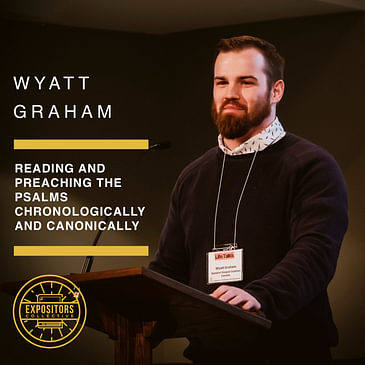Are the Psalms individual isolated poems that have no connection to one another, or are they a unified, edited story that we are supposed to notice? Wyatt Graham answers these questions and more in this conversation about how to think deeply about the Psalms, and what sort of connections should we expect to see from one chapter to the next.
Currently, he serves as the executive director of the Gospel Coalition Canada. He has spoken in a variety of ecclesial and academic settings and regularly writes a column called DeTrinitate for TGC Canada on the intersection of life and theology. He is married to Leanne, and they have one daughter and one son. Follow him on Twitter (@wagraham) and Instagram (@wyattagraham).
PhD, Biblical Theology, Southern Baptist Theological Seminary
ThM, Church History/Patristics, Southern Baptist Theological Seminary
ThM, Old Testament, Master’s Seminary
MDiv, Old Testament, Master’s Seminary
BA, Philosophy and Religion, Liberty University
To hear Wyatt's sermon on Mark 14 that was discussed at the end of the episode you can view it here: https://www.pbfchurch.ca/sermons/sermon/2024-02-25/its-all-in-gods-control
Recommended Episodes:
Preaching the Psalter as a Book - Lindsay Kennedy: https://expositorscollective.org/expositors-collective-podcast/preaching-the-psalter-as-a-book-lindsay-kennedy/
Preaching Christ from the Psalms - Lindsay Kennedy: https://expositorscollective.org/expositors-collective-podcast/preaching-christ-from-the-psalms-lindsay-kennedy-part-2/
Lindsay Kennedy's Bibliography for further reading:
Bibliography:
Psalmcast podcast
I recorded this several years ago but am still pretty happy with it all!
Robertson, The Flow of the Psalms
The best introduction to reading the Psalms as a book. Great place to start.
Rydelnik and Blum (eds.) The Moody Handbook of Messianic Prophecy
The Psalms essays are top-notch and closest to my view from anything I've read.
Jim Hamilton's Psalms Vol 1 and Vol 2 (EBTC, forthcoming)
Though Hamilton is heavy on typology, his is the best commentary that reads the Psalms as a book.
Reardon, Christ in the Psalms
He reads Jesus in every Psalm in the tradition of the Fathers. Quite devotional though and he doesn't defend his approach enough to convince the skeptical.
On that note, Irenaeus' On the Apostolic Preaching, Augustine's Psalms commentaries, and Athanasius' To Marcellinus on the Interpretation of the Psalms are all incredible and show that what I'm saying about Jesus in the Psalms is far from new (even if I don't quite "get" everything they're seeing!)
Mitchell, The Message of the Psalter
The most impacting book on my interpretation of the Psalms. Incredibly provocative and unique. Dense though.
Bates, The Birth of the Trinity
Prosopological exegesis as practiced by the Fathers was the missing piece for me. Very dense though.
You can find Wyatt's book -
The Promised Davidic King: Psalm 108’s Canonical Placement and Use of Earlier Psalms
(at a discounted rate) here. https://lexhampress.com/expositors
Pleasanton, California Expositors Collective Training Event May 24th & 25th
We’re excited to be partnering with Valley Community Church to host our first training seminar in the Bay Area. We have a lot of friends (and podcast downloads) in that part of California and we know that it is going to be a great time!
To register or for more information visit https://expositorscollective.org/gatherings/
The Expositors Collective podcast is part of the CGNMedia, Working together to proclaim the Gospel, make disciples, and plant churches. For more content like this, visit https://cgnmedia.org/
Join our private Facebook group to continue the conversation: https://www.facebook.com/groups/ExpositorsCollective
Click here to support Expositors Collective





